Report on Entrepreneurship & Small Business Management, University
VerifiedAdded on 2023/01/13
|16
|4377
|60
Report
AI Summary
This report provides a comprehensive overview of entrepreneurship and small business management. It begins by defining entrepreneurship and then explores various types of entrepreneurial ventures, including small business entrepreneurship, start-up entrepreneurship, large company entrepreneurship, and social entrepreneurship, relating each to the typology of entrepreneurship. The report then delves into the similarities and differences between these ventures, followed by an analysis of the impact of micro and small businesses on the economy, particularly in the UK, highlighting their contributions to employment and turnover. The importance of small businesses and business start-ups in fostering social economic growth is also discussed. The report further examines the characteristic traits and skills of successful entrepreneurs and how their personality reflects their motivation and mindset. Finally, it explores factors that can either foster or hinder entrepreneurship. The report draws conclusions based on the analysis and provides references to support the information presented.
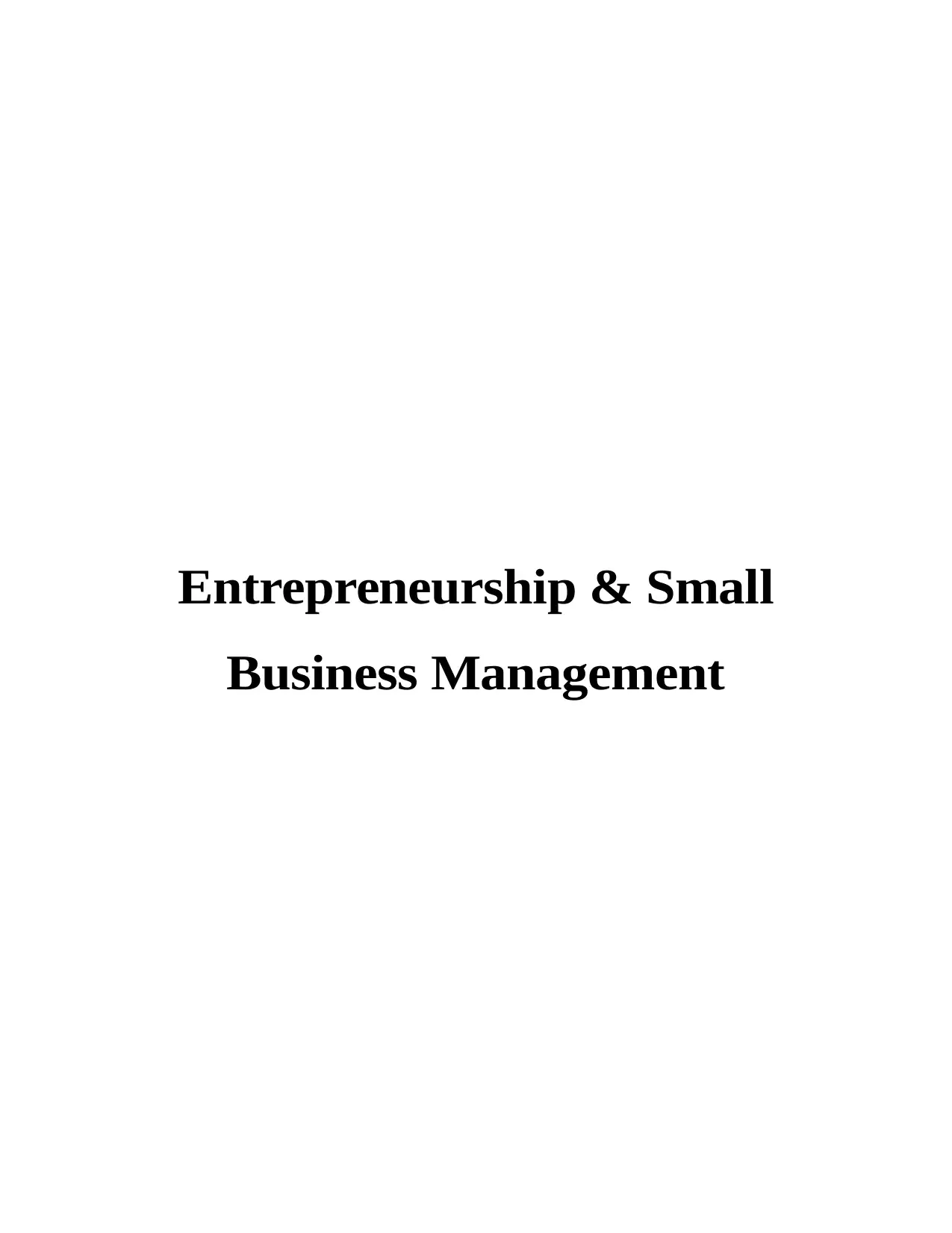
Entrepreneurship & Small
Business Management
Business Management
Paraphrase This Document
Need a fresh take? Get an instant paraphrase of this document with our AI Paraphraser
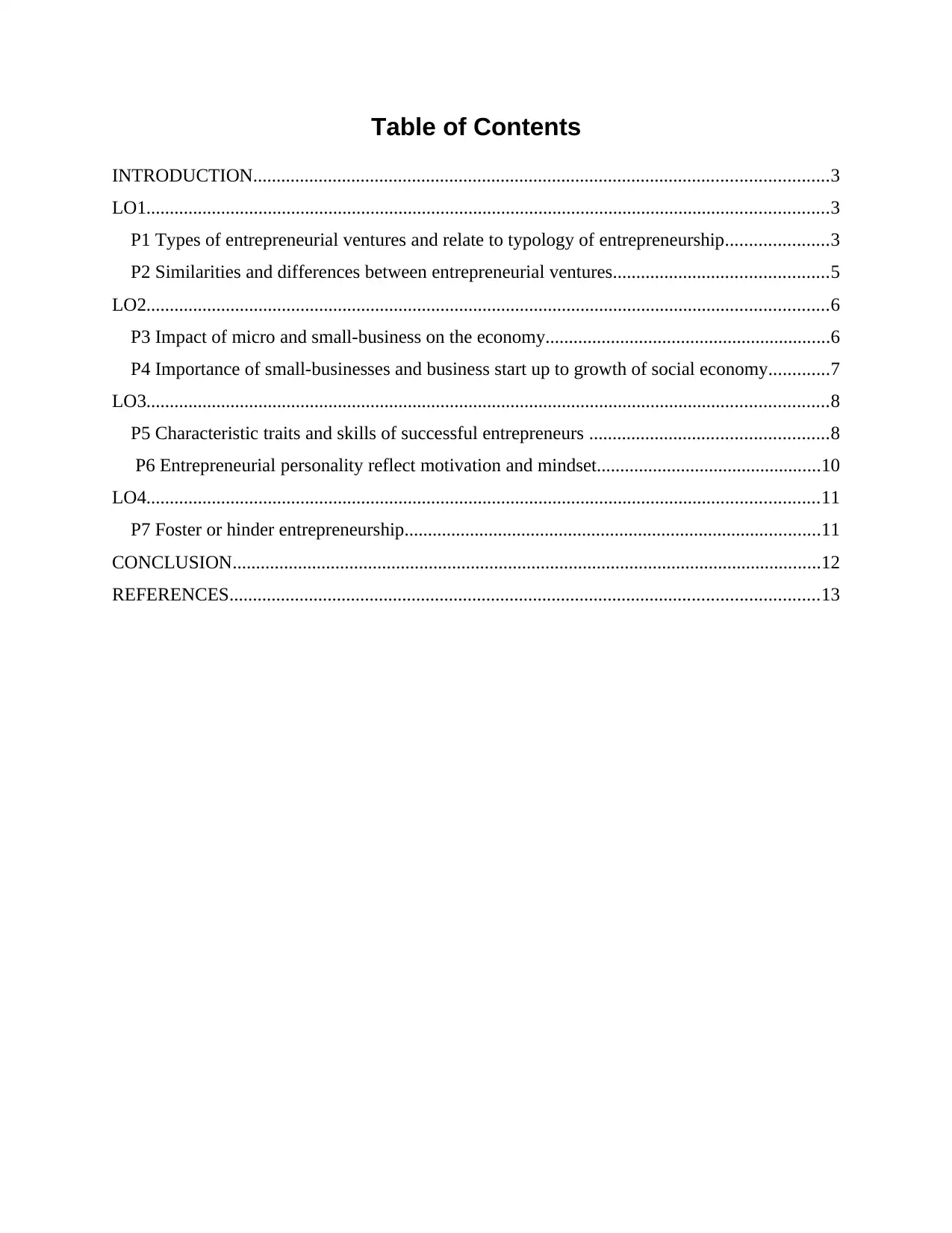
Table of Contents
INTRODUCTION...........................................................................................................................3
LO1..................................................................................................................................................3
P1 Types of entrepreneurial ventures and relate to typology of entrepreneurship......................3
P2 Similarities and differences between entrepreneurial ventures..............................................5
LO2..................................................................................................................................................6
P3 Impact of micro and small-business on the economy.............................................................6
P4 Importance of small-businesses and business start up to growth of social economy.............7
LO3..................................................................................................................................................8
P5 Characteristic traits and skills of successful entrepreneurs ...................................................8
P6 Entrepreneurial personality reflect motivation and mindset................................................10
LO4................................................................................................................................................11
P7 Foster or hinder entrepreneurship.........................................................................................11
CONCLUSION..............................................................................................................................12
REFERENCES..............................................................................................................................13
INTRODUCTION...........................................................................................................................3
LO1..................................................................................................................................................3
P1 Types of entrepreneurial ventures and relate to typology of entrepreneurship......................3
P2 Similarities and differences between entrepreneurial ventures..............................................5
LO2..................................................................................................................................................6
P3 Impact of micro and small-business on the economy.............................................................6
P4 Importance of small-businesses and business start up to growth of social economy.............7
LO3..................................................................................................................................................8
P5 Characteristic traits and skills of successful entrepreneurs ...................................................8
P6 Entrepreneurial personality reflect motivation and mindset................................................10
LO4................................................................................................................................................11
P7 Foster or hinder entrepreneurship.........................................................................................11
CONCLUSION..............................................................................................................................12
REFERENCES..............................................................................................................................13
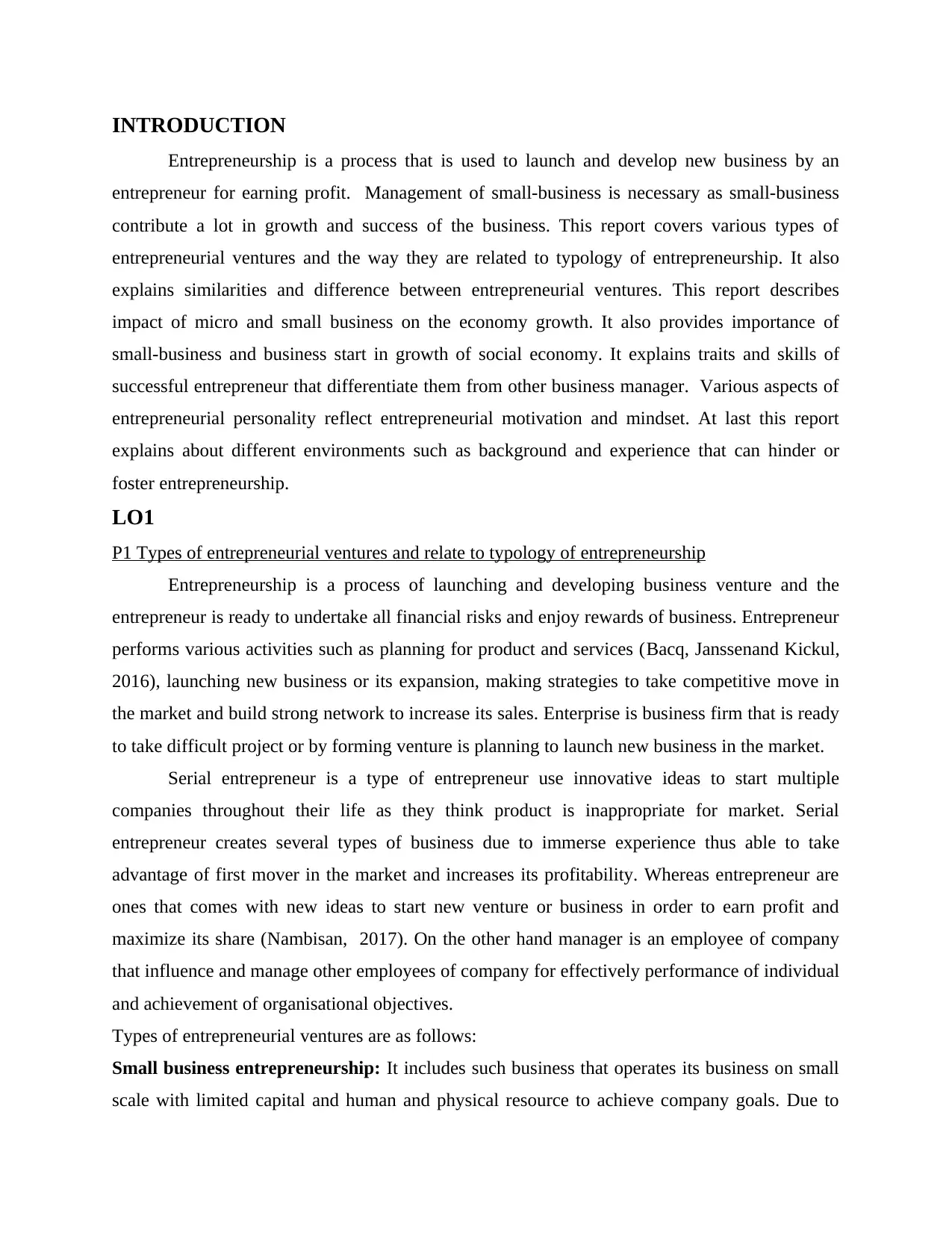
INTRODUCTION
Entrepreneurship is a process that is used to launch and develop new business by an
entrepreneur for earning profit. Management of small-business is necessary as small-business
contribute a lot in growth and success of the business. This report covers various types of
entrepreneurial ventures and the way they are related to typology of entrepreneurship. It also
explains similarities and difference between entrepreneurial ventures. This report describes
impact of micro and small business on the economy growth. It also provides importance of
small-business and business start in growth of social economy. It explains traits and skills of
successful entrepreneur that differentiate them from other business manager. Various aspects of
entrepreneurial personality reflect entrepreneurial motivation and mindset. At last this report
explains about different environments such as background and experience that can hinder or
foster entrepreneurship.
LO1
P1 Types of entrepreneurial ventures and relate to typology of entrepreneurship
Entrepreneurship is a process of launching and developing business venture and the
entrepreneur is ready to undertake all financial risks and enjoy rewards of business. Entrepreneur
performs various activities such as planning for product and services (Bacq, Janssenand Kickul,
2016), launching new business or its expansion, making strategies to take competitive move in
the market and build strong network to increase its sales. Enterprise is business firm that is ready
to take difficult project or by forming venture is planning to launch new business in the market.
Serial entrepreneur is a type of entrepreneur use innovative ideas to start multiple
companies throughout their life as they think product is inappropriate for market. Serial
entrepreneur creates several types of business due to immerse experience thus able to take
advantage of first mover in the market and increases its profitability. Whereas entrepreneur are
ones that comes with new ideas to start new venture or business in order to earn profit and
maximize its share (Nambisan, 2017). On the other hand manager is an employee of company
that influence and manage other employees of company for effectively performance of individual
and achievement of organisational objectives.
Types of entrepreneurial ventures are as follows:
Small business entrepreneurship: It includes such business that operates its business on small
scale with limited capital and human and physical resource to achieve company goals. Due to
Entrepreneurship is a process that is used to launch and develop new business by an
entrepreneur for earning profit. Management of small-business is necessary as small-business
contribute a lot in growth and success of the business. This report covers various types of
entrepreneurial ventures and the way they are related to typology of entrepreneurship. It also
explains similarities and difference between entrepreneurial ventures. This report describes
impact of micro and small business on the economy growth. It also provides importance of
small-business and business start in growth of social economy. It explains traits and skills of
successful entrepreneur that differentiate them from other business manager. Various aspects of
entrepreneurial personality reflect entrepreneurial motivation and mindset. At last this report
explains about different environments such as background and experience that can hinder or
foster entrepreneurship.
LO1
P1 Types of entrepreneurial ventures and relate to typology of entrepreneurship
Entrepreneurship is a process of launching and developing business venture and the
entrepreneur is ready to undertake all financial risks and enjoy rewards of business. Entrepreneur
performs various activities such as planning for product and services (Bacq, Janssenand Kickul,
2016), launching new business or its expansion, making strategies to take competitive move in
the market and build strong network to increase its sales. Enterprise is business firm that is ready
to take difficult project or by forming venture is planning to launch new business in the market.
Serial entrepreneur is a type of entrepreneur use innovative ideas to start multiple
companies throughout their life as they think product is inappropriate for market. Serial
entrepreneur creates several types of business due to immerse experience thus able to take
advantage of first mover in the market and increases its profitability. Whereas entrepreneur are
ones that comes with new ideas to start new venture or business in order to earn profit and
maximize its share (Nambisan, 2017). On the other hand manager is an employee of company
that influence and manage other employees of company for effectively performance of individual
and achievement of organisational objectives.
Types of entrepreneurial ventures are as follows:
Small business entrepreneurship: It includes such business that operates its business on small
scale with limited capital and human and physical resource to achieve company goals. Due to
⊘ This is a preview!⊘
Do you want full access?
Subscribe today to unlock all pages.

Trusted by 1+ million students worldwide
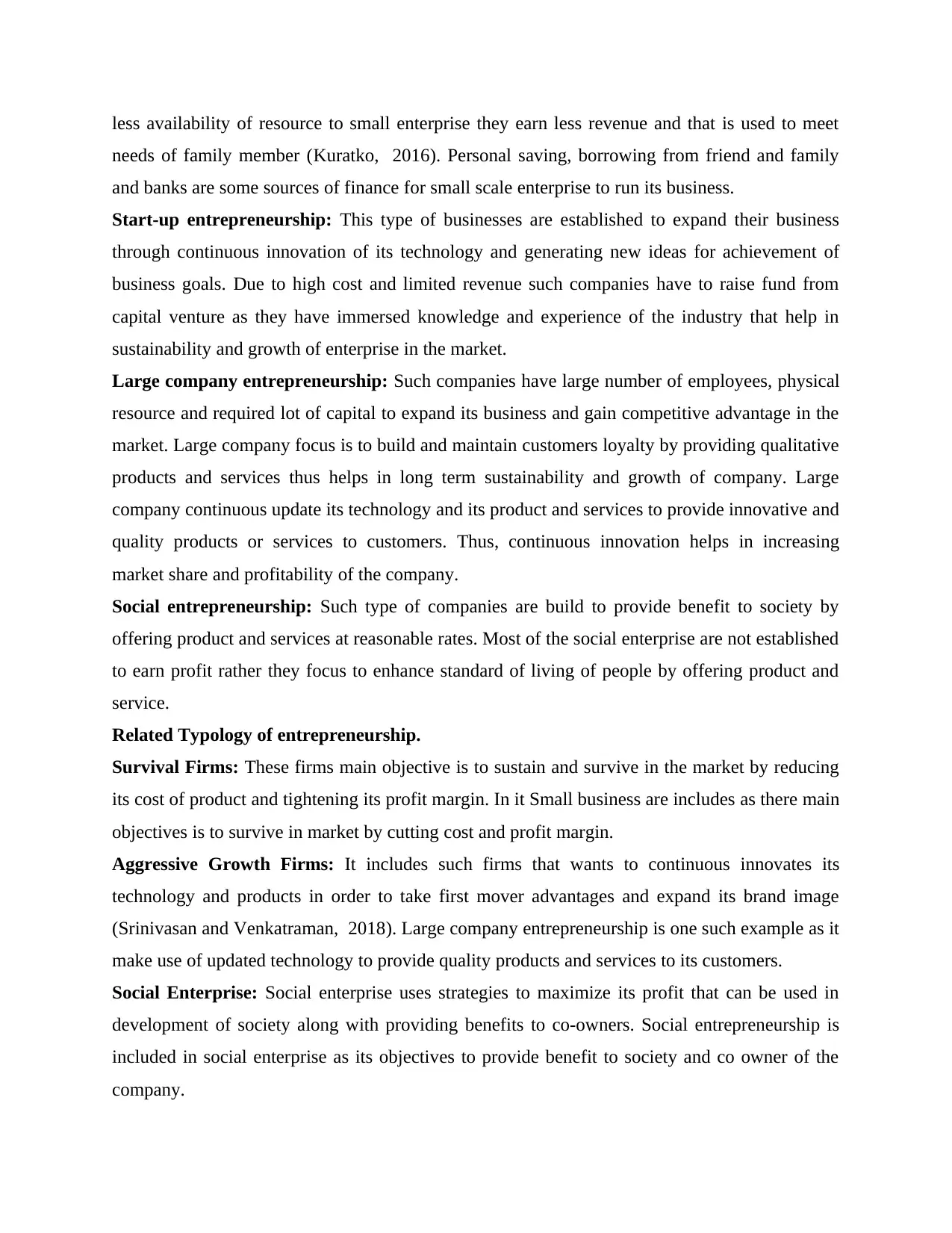
less availability of resource to small enterprise they earn less revenue and that is used to meet
needs of family member (Kuratko, 2016). Personal saving, borrowing from friend and family
and banks are some sources of finance for small scale enterprise to run its business.
Start-up entrepreneurship: This type of businesses are established to expand their business
through continuous innovation of its technology and generating new ideas for achievement of
business goals. Due to high cost and limited revenue such companies have to raise fund from
capital venture as they have immersed knowledge and experience of the industry that help in
sustainability and growth of enterprise in the market.
Large company entrepreneurship: Such companies have large number of employees, physical
resource and required lot of capital to expand its business and gain competitive advantage in the
market. Large company focus is to build and maintain customers loyalty by providing qualitative
products and services thus helps in long term sustainability and growth of company. Large
company continuous update its technology and its product and services to provide innovative and
quality products or services to customers. Thus, continuous innovation helps in increasing
market share and profitability of the company.
Social entrepreneurship: Such type of companies are build to provide benefit to society by
offering product and services at reasonable rates. Most of the social enterprise are not established
to earn profit rather they focus to enhance standard of living of people by offering product and
service.
Related Typology of entrepreneurship.
Survival Firms: These firms main objective is to sustain and survive in the market by reducing
its cost of product and tightening its profit margin. In it Small business are includes as there main
objectives is to survive in market by cutting cost and profit margin.
Aggressive Growth Firms: It includes such firms that wants to continuous innovates its
technology and products in order to take first mover advantages and expand its brand image
(Srinivasan and Venkatraman, 2018). Large company entrepreneurship is one such example as it
make use of updated technology to provide quality products and services to its customers.
Social Enterprise: Social enterprise uses strategies to maximize its profit that can be used in
development of society along with providing benefits to co-owners. Social entrepreneurship is
included in social enterprise as its objectives to provide benefit to society and co owner of the
company.
needs of family member (Kuratko, 2016). Personal saving, borrowing from friend and family
and banks are some sources of finance for small scale enterprise to run its business.
Start-up entrepreneurship: This type of businesses are established to expand their business
through continuous innovation of its technology and generating new ideas for achievement of
business goals. Due to high cost and limited revenue such companies have to raise fund from
capital venture as they have immersed knowledge and experience of the industry that help in
sustainability and growth of enterprise in the market.
Large company entrepreneurship: Such companies have large number of employees, physical
resource and required lot of capital to expand its business and gain competitive advantage in the
market. Large company focus is to build and maintain customers loyalty by providing qualitative
products and services thus helps in long term sustainability and growth of company. Large
company continuous update its technology and its product and services to provide innovative and
quality products or services to customers. Thus, continuous innovation helps in increasing
market share and profitability of the company.
Social entrepreneurship: Such type of companies are build to provide benefit to society by
offering product and services at reasonable rates. Most of the social enterprise are not established
to earn profit rather they focus to enhance standard of living of people by offering product and
service.
Related Typology of entrepreneurship.
Survival Firms: These firms main objective is to sustain and survive in the market by reducing
its cost of product and tightening its profit margin. In it Small business are includes as there main
objectives is to survive in market by cutting cost and profit margin.
Aggressive Growth Firms: It includes such firms that wants to continuous innovates its
technology and products in order to take first mover advantages and expand its brand image
(Srinivasan and Venkatraman, 2018). Large company entrepreneurship is one such example as it
make use of updated technology to provide quality products and services to its customers.
Social Enterprise: Social enterprise uses strategies to maximize its profit that can be used in
development of society along with providing benefits to co-owners. Social entrepreneurship is
included in social enterprise as its objectives to provide benefit to society and co owner of the
company.
Paraphrase This Document
Need a fresh take? Get an instant paraphrase of this document with our AI Paraphraser
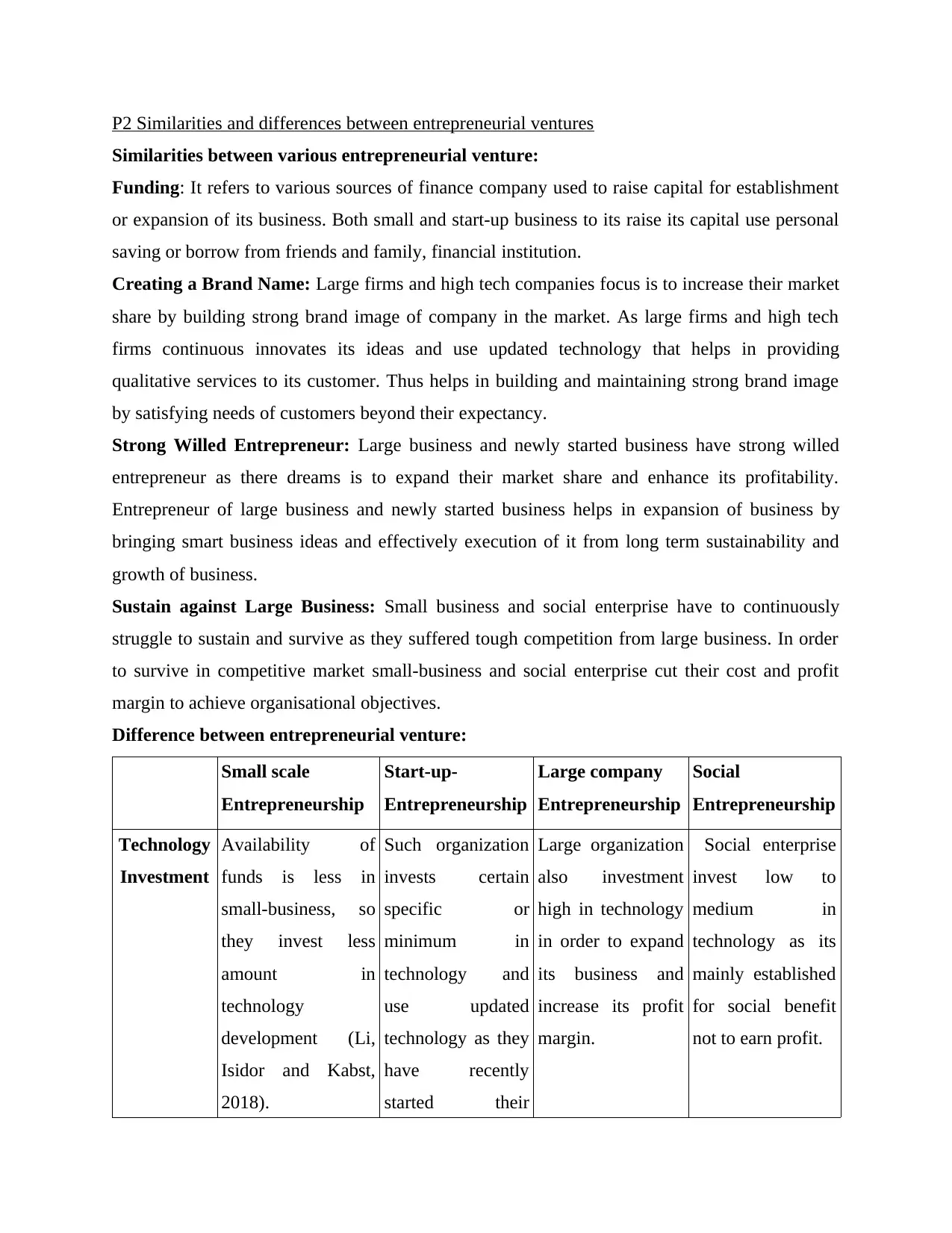
P2 Similarities and differences between entrepreneurial ventures
Similarities between various entrepreneurial venture:
Funding: It refers to various sources of finance company used to raise capital for establishment
or expansion of its business. Both small and start-up business to its raise its capital use personal
saving or borrow from friends and family, financial institution.
Creating a Brand Name: Large firms and high tech companies focus is to increase their market
share by building strong brand image of company in the market. As large firms and high tech
firms continuous innovates its ideas and use updated technology that helps in providing
qualitative services to its customer. Thus helps in building and maintaining strong brand image
by satisfying needs of customers beyond their expectancy.
Strong Willed Entrepreneur: Large business and newly started business have strong willed
entrepreneur as there dreams is to expand their market share and enhance its profitability.
Entrepreneur of large business and newly started business helps in expansion of business by
bringing smart business ideas and effectively execution of it from long term sustainability and
growth of business.
Sustain against Large Business: Small business and social enterprise have to continuously
struggle to sustain and survive as they suffered tough competition from large business. In order
to survive in competitive market small-business and social enterprise cut their cost and profit
margin to achieve organisational objectives.
Difference between entrepreneurial venture:
Small scale
Entrepreneurship
Start-up-
Entrepreneurship
Large company
Entrepreneurship
Social
Entrepreneurship
Technology
Investment
Availability of
funds is less in
small-business, so
they invest less
amount in
technology
development (Li,
Isidor and Kabst,
2018).
Such organization
invests certain
specific or
minimum in
technology and
use updated
technology as they
have recently
started their
Large organization
also investment
high in technology
in order to expand
its business and
increase its profit
margin.
Social enterprise
invest low to
medium in
technology as its
mainly established
for social benefit
not to earn profit.
Similarities between various entrepreneurial venture:
Funding: It refers to various sources of finance company used to raise capital for establishment
or expansion of its business. Both small and start-up business to its raise its capital use personal
saving or borrow from friends and family, financial institution.
Creating a Brand Name: Large firms and high tech companies focus is to increase their market
share by building strong brand image of company in the market. As large firms and high tech
firms continuous innovates its ideas and use updated technology that helps in providing
qualitative services to its customer. Thus helps in building and maintaining strong brand image
by satisfying needs of customers beyond their expectancy.
Strong Willed Entrepreneur: Large business and newly started business have strong willed
entrepreneur as there dreams is to expand their market share and enhance its profitability.
Entrepreneur of large business and newly started business helps in expansion of business by
bringing smart business ideas and effectively execution of it from long term sustainability and
growth of business.
Sustain against Large Business: Small business and social enterprise have to continuously
struggle to sustain and survive as they suffered tough competition from large business. In order
to survive in competitive market small-business and social enterprise cut their cost and profit
margin to achieve organisational objectives.
Difference between entrepreneurial venture:
Small scale
Entrepreneurship
Start-up-
Entrepreneurship
Large company
Entrepreneurship
Social
Entrepreneurship
Technology
Investment
Availability of
funds is less in
small-business, so
they invest less
amount in
technology
development (Li,
Isidor and Kabst,
2018).
Such organization
invests certain
specific or
minimum in
technology and
use updated
technology as they
have recently
started their
Large organization
also investment
high in technology
in order to expand
its business and
increase its profit
margin.
Social enterprise
invest low to
medium in
technology as its
mainly established
for social benefit
not to earn profit.
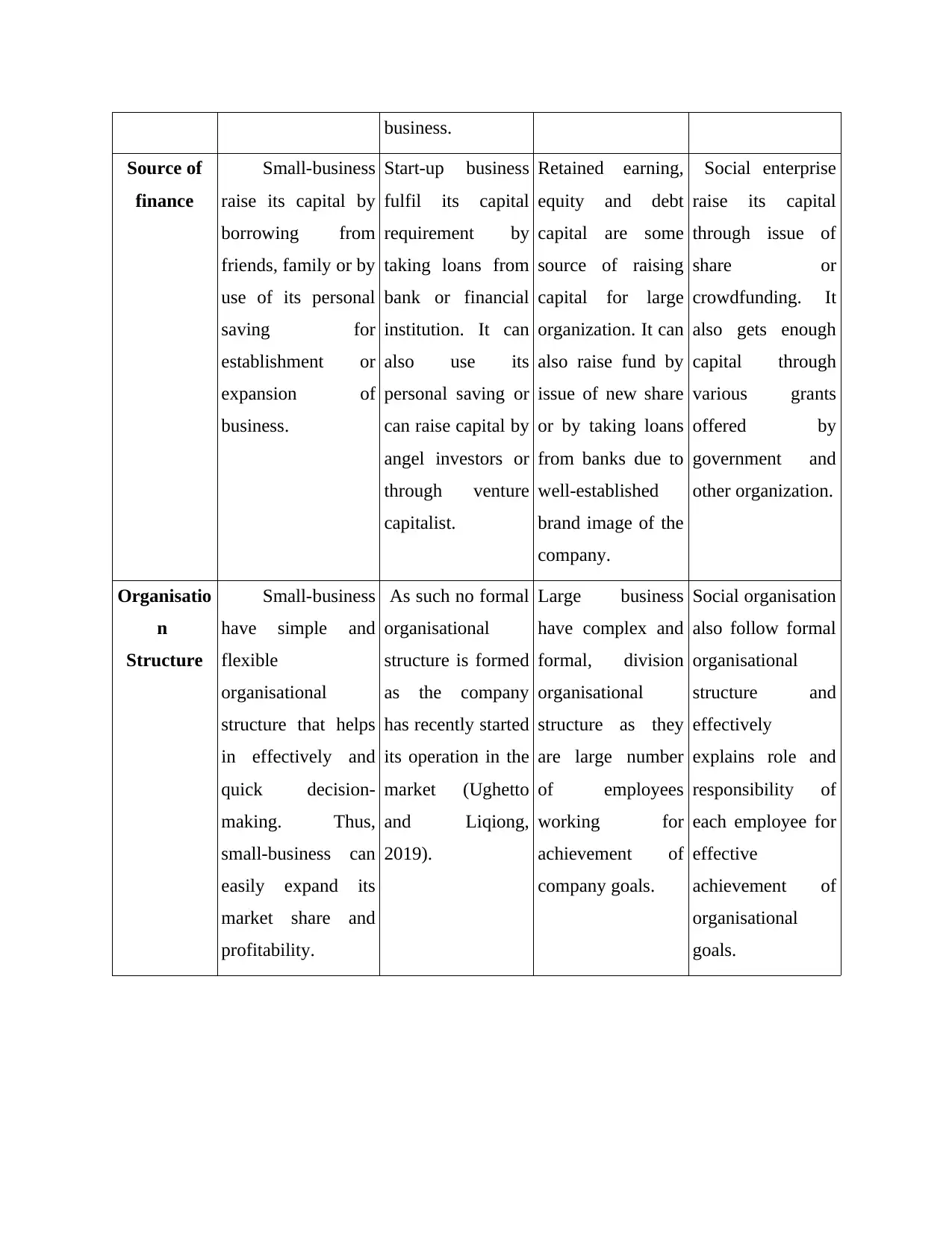
business.
Source of
finance
Small-business
raise its capital by
borrowing from
friends, family or by
use of its personal
saving for
establishment or
expansion of
business.
Start-up business
fulfil its capital
requirement by
taking loans from
bank or financial
institution. It can
also use its
personal saving or
can raise capital by
angel investors or
through venture
capitalist.
Retained earning,
equity and debt
capital are some
source of raising
capital for large
organization. It can
also raise fund by
issue of new share
or by taking loans
from banks due to
well-established
brand image of the
company.
Social enterprise
raise its capital
through issue of
share or
crowdfunding. It
also gets enough
capital through
various grants
offered by
government and
other organization.
Organisatio
n
Structure
Small-business
have simple and
flexible
organisational
structure that helps
in effectively and
quick decision-
making. Thus,
small-business can
easily expand its
market share and
profitability.
As such no formal
organisational
structure is formed
as the company
has recently started
its operation in the
market (Ughetto
and Liqiong,
2019).
Large business
have complex and
formal, division
organisational
structure as they
are large number
of employees
working for
achievement of
company goals.
Social organisation
also follow formal
organisational
structure and
effectively
explains role and
responsibility of
each employee for
effective
achievement of
organisational
goals.
Source of
finance
Small-business
raise its capital by
borrowing from
friends, family or by
use of its personal
saving for
establishment or
expansion of
business.
Start-up business
fulfil its capital
requirement by
taking loans from
bank or financial
institution. It can
also use its
personal saving or
can raise capital by
angel investors or
through venture
capitalist.
Retained earning,
equity and debt
capital are some
source of raising
capital for large
organization. It can
also raise fund by
issue of new share
or by taking loans
from banks due to
well-established
brand image of the
company.
Social enterprise
raise its capital
through issue of
share or
crowdfunding. It
also gets enough
capital through
various grants
offered by
government and
other organization.
Organisatio
n
Structure
Small-business
have simple and
flexible
organisational
structure that helps
in effectively and
quick decision-
making. Thus,
small-business can
easily expand its
market share and
profitability.
As such no formal
organisational
structure is formed
as the company
has recently started
its operation in the
market (Ughetto
and Liqiong,
2019).
Large business
have complex and
formal, division
organisational
structure as they
are large number
of employees
working for
achievement of
company goals.
Social organisation
also follow formal
organisational
structure and
effectively
explains role and
responsibility of
each employee for
effective
achievement of
organisational
goals.
⊘ This is a preview!⊘
Do you want full access?
Subscribe today to unlock all pages.

Trusted by 1+ million students worldwide
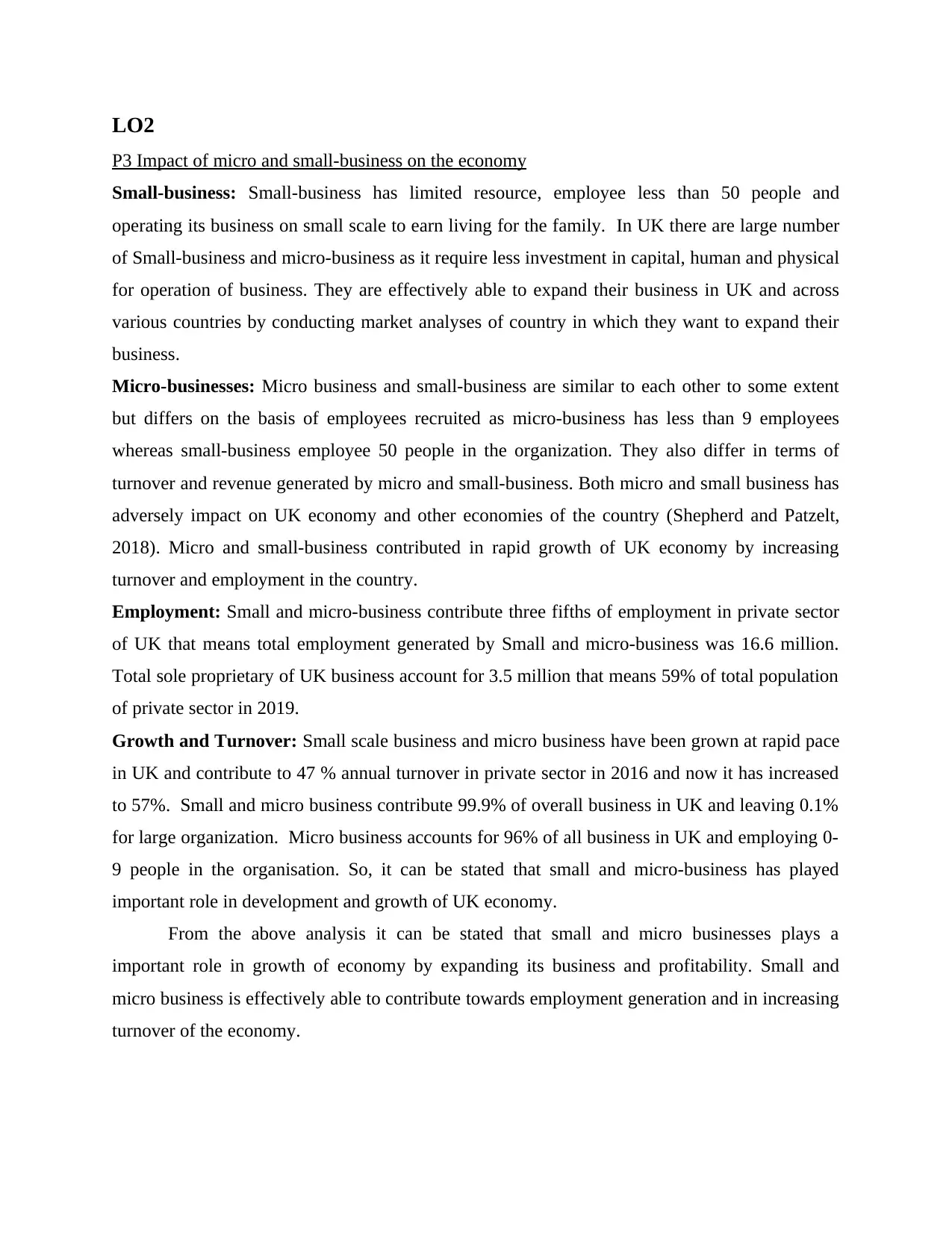
LO2
P3 Impact of micro and small-business on the economy
Small-business: Small-business has limited resource, employee less than 50 people and
operating its business on small scale to earn living for the family. In UK there are large number
of Small-business and micro-business as it require less investment in capital, human and physical
for operation of business. They are effectively able to expand their business in UK and across
various countries by conducting market analyses of country in which they want to expand their
business.
Micro-businesses: Micro business and small-business are similar to each other to some extent
but differs on the basis of employees recruited as micro-business has less than 9 employees
whereas small-business employee 50 people in the organization. They also differ in terms of
turnover and revenue generated by micro and small-business. Both micro and small business has
adversely impact on UK economy and other economies of the country (Shepherd and Patzelt,
2018). Micro and small-business contributed in rapid growth of UK economy by increasing
turnover and employment in the country.
Employment: Small and micro-business contribute three fifths of employment in private sector
of UK that means total employment generated by Small and micro-business was 16.6 million.
Total sole proprietary of UK business account for 3.5 million that means 59% of total population
of private sector in 2019.
Growth and Turnover: Small scale business and micro business have been grown at rapid pace
in UK and contribute to 47 % annual turnover in private sector in 2016 and now it has increased
to 57%. Small and micro business contribute 99.9% of overall business in UK and leaving 0.1%
for large organization. Micro business accounts for 96% of all business in UK and employing 0-
9 people in the organisation. So, it can be stated that small and micro-business has played
important role in development and growth of UK economy.
From the above analysis it can be stated that small and micro businesses plays a
important role in growth of economy by expanding its business and profitability. Small and
micro business is effectively able to contribute towards employment generation and in increasing
turnover of the economy.
P3 Impact of micro and small-business on the economy
Small-business: Small-business has limited resource, employee less than 50 people and
operating its business on small scale to earn living for the family. In UK there are large number
of Small-business and micro-business as it require less investment in capital, human and physical
for operation of business. They are effectively able to expand their business in UK and across
various countries by conducting market analyses of country in which they want to expand their
business.
Micro-businesses: Micro business and small-business are similar to each other to some extent
but differs on the basis of employees recruited as micro-business has less than 9 employees
whereas small-business employee 50 people in the organization. They also differ in terms of
turnover and revenue generated by micro and small-business. Both micro and small business has
adversely impact on UK economy and other economies of the country (Shepherd and Patzelt,
2018). Micro and small-business contributed in rapid growth of UK economy by increasing
turnover and employment in the country.
Employment: Small and micro-business contribute three fifths of employment in private sector
of UK that means total employment generated by Small and micro-business was 16.6 million.
Total sole proprietary of UK business account for 3.5 million that means 59% of total population
of private sector in 2019.
Growth and Turnover: Small scale business and micro business have been grown at rapid pace
in UK and contribute to 47 % annual turnover in private sector in 2016 and now it has increased
to 57%. Small and micro business contribute 99.9% of overall business in UK and leaving 0.1%
for large organization. Micro business accounts for 96% of all business in UK and employing 0-
9 people in the organisation. So, it can be stated that small and micro-business has played
important role in development and growth of UK economy.
From the above analysis it can be stated that small and micro businesses plays a
important role in growth of economy by expanding its business and profitability. Small and
micro business is effectively able to contribute towards employment generation and in increasing
turnover of the economy.
Paraphrase This Document
Need a fresh take? Get an instant paraphrase of this document with our AI Paraphraser
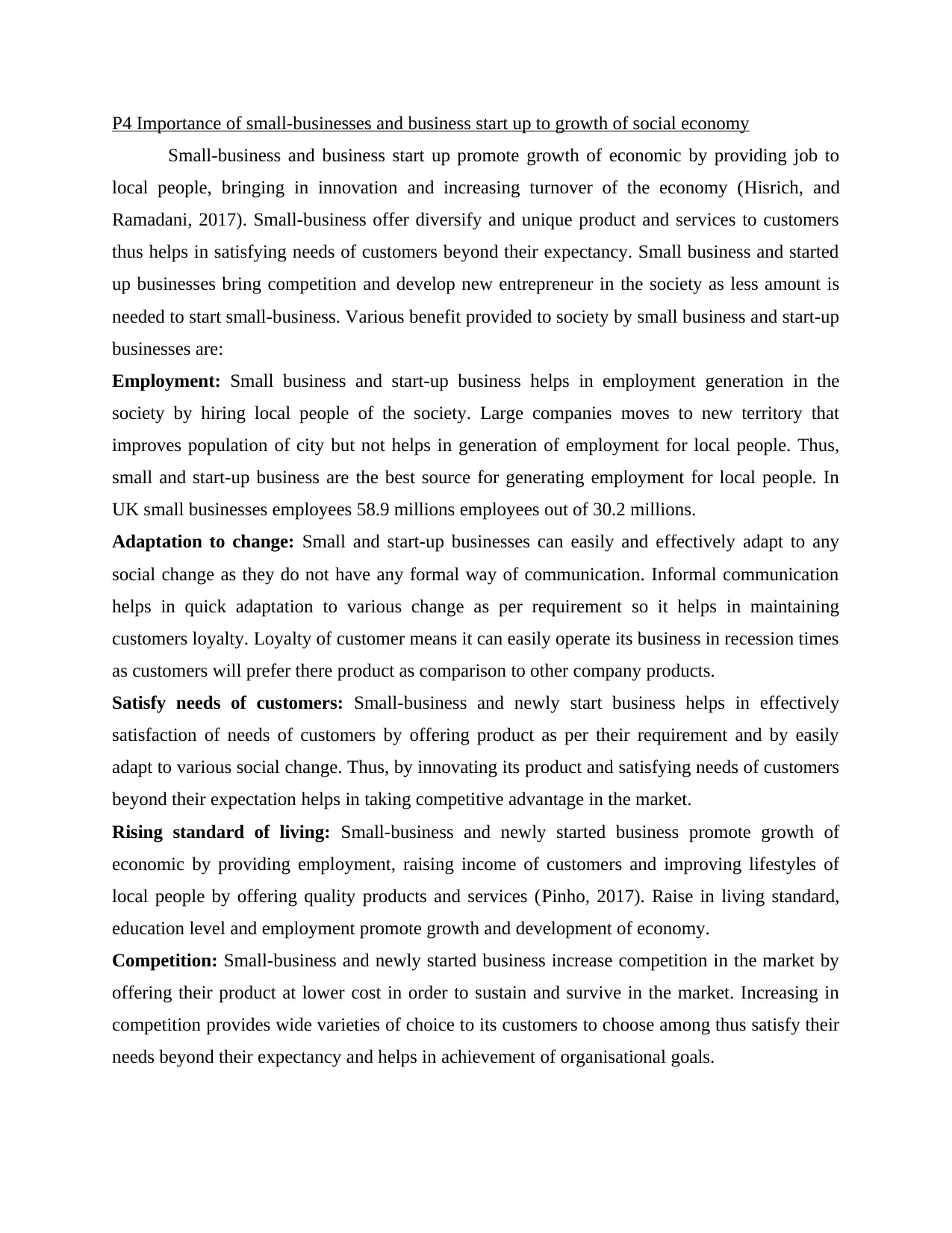
P4 Importance of small-businesses and business start up to growth of social economy
Small-business and business start up promote growth of economic by providing job to
local people, bringing in innovation and increasing turnover of the economy (Hisrich, and
Ramadani, 2017). Small-business offer diversify and unique product and services to customers
thus helps in satisfying needs of customers beyond their expectancy. Small business and started
up businesses bring competition and develop new entrepreneur in the society as less amount is
needed to start small-business. Various benefit provided to society by small business and start-up
businesses are:
Employment: Small business and start-up business helps in employment generation in the
society by hiring local people of the society. Large companies moves to new territory that
improves population of city but not helps in generation of employment for local people. Thus,
small and start-up business are the best source for generating employment for local people. In
UK small businesses employees 58.9 millions employees out of 30.2 millions.
Adaptation to change: Small and start-up businesses can easily and effectively adapt to any
social change as they do not have any formal way of communication. Informal communication
helps in quick adaptation to various change as per requirement so it helps in maintaining
customers loyalty. Loyalty of customer means it can easily operate its business in recession times
as customers will prefer there product as comparison to other company products.
Satisfy needs of customers: Small-business and newly start business helps in effectively
satisfaction of needs of customers by offering product as per their requirement and by easily
adapt to various social change. Thus, by innovating its product and satisfying needs of customers
beyond their expectation helps in taking competitive advantage in the market.
Rising standard of living: Small-business and newly started business promote growth of
economic by providing employment, raising income of customers and improving lifestyles of
local people by offering quality products and services (Pinho, 2017). Raise in living standard,
education level and employment promote growth and development of economy.
Competition: Small-business and newly started business increase competition in the market by
offering their product at lower cost in order to sustain and survive in the market. Increasing in
competition provides wide varieties of choice to its customers to choose among thus satisfy their
needs beyond their expectancy and helps in achievement of organisational goals.
Small-business and business start up promote growth of economic by providing job to
local people, bringing in innovation and increasing turnover of the economy (Hisrich, and
Ramadani, 2017). Small-business offer diversify and unique product and services to customers
thus helps in satisfying needs of customers beyond their expectancy. Small business and started
up businesses bring competition and develop new entrepreneur in the society as less amount is
needed to start small-business. Various benefit provided to society by small business and start-up
businesses are:
Employment: Small business and start-up business helps in employment generation in the
society by hiring local people of the society. Large companies moves to new territory that
improves population of city but not helps in generation of employment for local people. Thus,
small and start-up business are the best source for generating employment for local people. In
UK small businesses employees 58.9 millions employees out of 30.2 millions.
Adaptation to change: Small and start-up businesses can easily and effectively adapt to any
social change as they do not have any formal way of communication. Informal communication
helps in quick adaptation to various change as per requirement so it helps in maintaining
customers loyalty. Loyalty of customer means it can easily operate its business in recession times
as customers will prefer there product as comparison to other company products.
Satisfy needs of customers: Small-business and newly start business helps in effectively
satisfaction of needs of customers by offering product as per their requirement and by easily
adapt to various social change. Thus, by innovating its product and satisfying needs of customers
beyond their expectation helps in taking competitive advantage in the market.
Rising standard of living: Small-business and newly started business promote growth of
economic by providing employment, raising income of customers and improving lifestyles of
local people by offering quality products and services (Pinho, 2017). Raise in living standard,
education level and employment promote growth and development of economy.
Competition: Small-business and newly started business increase competition in the market by
offering their product at lower cost in order to sustain and survive in the market. Increasing in
competition provides wide varieties of choice to its customers to choose among thus satisfy their
needs beyond their expectancy and helps in achievement of organisational goals.
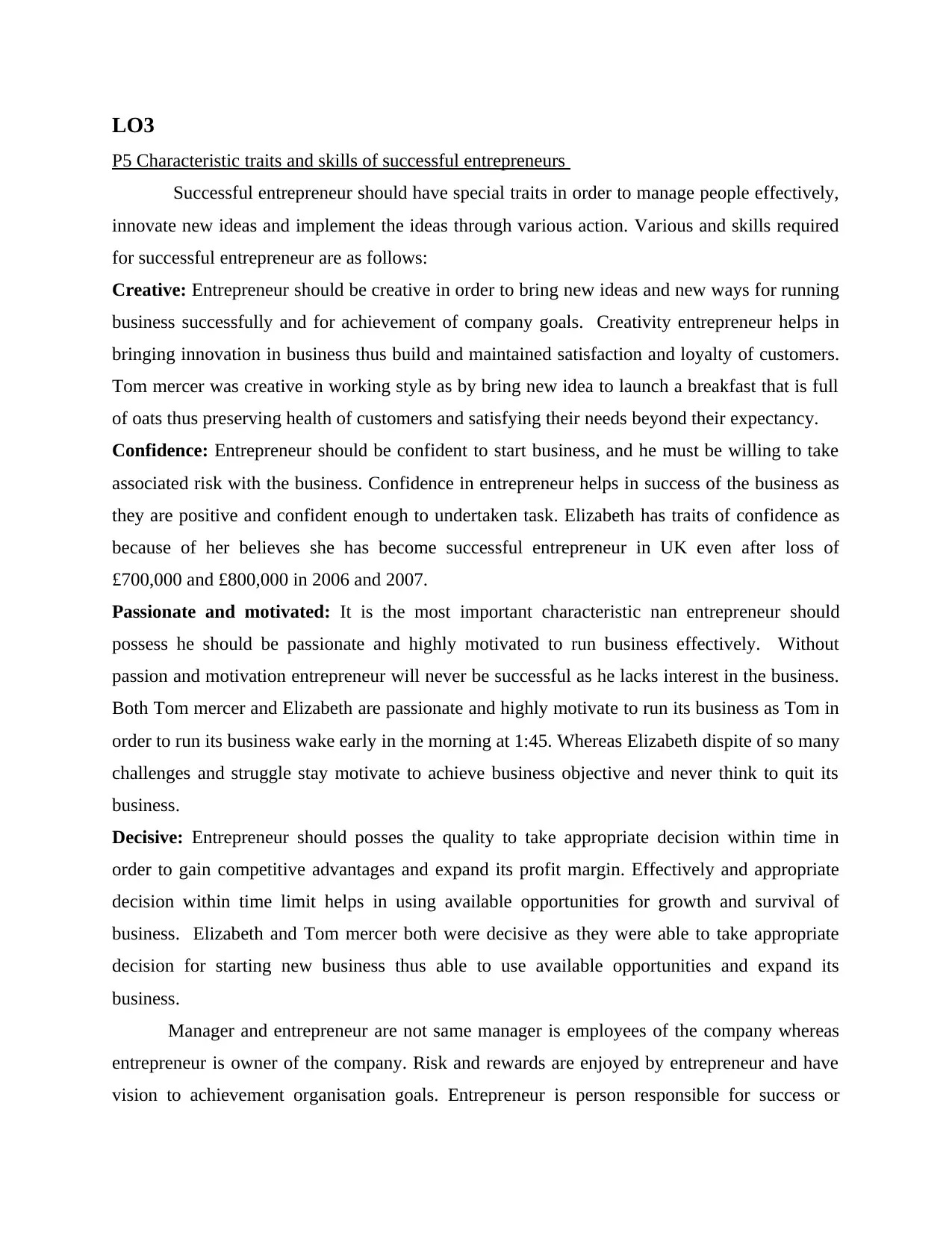
LO3
P5 Characteristic traits and skills of successful entrepreneurs
Successful entrepreneur should have special traits in order to manage people effectively,
innovate new ideas and implement the ideas through various action. Various and skills required
for successful entrepreneur are as follows:
Creative: Entrepreneur should be creative in order to bring new ideas and new ways for running
business successfully and for achievement of company goals. Creativity entrepreneur helps in
bringing innovation in business thus build and maintained satisfaction and loyalty of customers.
Tom mercer was creative in working style as by bring new idea to launch a breakfast that is full
of oats thus preserving health of customers and satisfying their needs beyond their expectancy.
Confidence: Entrepreneur should be confident to start business, and he must be willing to take
associated risk with the business. Confidence in entrepreneur helps in success of the business as
they are positive and confident enough to undertaken task. Elizabeth has traits of confidence as
because of her believes she has become successful entrepreneur in UK even after loss of
£700,000 and £800,000 in 2006 and 2007.
Passionate and motivated: It is the most important characteristic nan entrepreneur should
possess he should be passionate and highly motivated to run business effectively. Without
passion and motivation entrepreneur will never be successful as he lacks interest in the business.
Both Tom mercer and Elizabeth are passionate and highly motivate to run its business as Tom in
order to run its business wake early in the morning at 1:45. Whereas Elizabeth dispite of so many
challenges and struggle stay motivate to achieve business objective and never think to quit its
business.
Decisive: Entrepreneur should posses the quality to take appropriate decision within time in
order to gain competitive advantages and expand its profit margin. Effectively and appropriate
decision within time limit helps in using available opportunities for growth and survival of
business. Elizabeth and Tom mercer both were decisive as they were able to take appropriate
decision for starting new business thus able to use available opportunities and expand its
business.
Manager and entrepreneur are not same manager is employees of the company whereas
entrepreneur is owner of the company. Risk and rewards are enjoyed by entrepreneur and have
vision to achievement organisation goals. Entrepreneur is person responsible for success or
P5 Characteristic traits and skills of successful entrepreneurs
Successful entrepreneur should have special traits in order to manage people effectively,
innovate new ideas and implement the ideas through various action. Various and skills required
for successful entrepreneur are as follows:
Creative: Entrepreneur should be creative in order to bring new ideas and new ways for running
business successfully and for achievement of company goals. Creativity entrepreneur helps in
bringing innovation in business thus build and maintained satisfaction and loyalty of customers.
Tom mercer was creative in working style as by bring new idea to launch a breakfast that is full
of oats thus preserving health of customers and satisfying their needs beyond their expectancy.
Confidence: Entrepreneur should be confident to start business, and he must be willing to take
associated risk with the business. Confidence in entrepreneur helps in success of the business as
they are positive and confident enough to undertaken task. Elizabeth has traits of confidence as
because of her believes she has become successful entrepreneur in UK even after loss of
£700,000 and £800,000 in 2006 and 2007.
Passionate and motivated: It is the most important characteristic nan entrepreneur should
possess he should be passionate and highly motivated to run business effectively. Without
passion and motivation entrepreneur will never be successful as he lacks interest in the business.
Both Tom mercer and Elizabeth are passionate and highly motivate to run its business as Tom in
order to run its business wake early in the morning at 1:45. Whereas Elizabeth dispite of so many
challenges and struggle stay motivate to achieve business objective and never think to quit its
business.
Decisive: Entrepreneur should posses the quality to take appropriate decision within time in
order to gain competitive advantages and expand its profit margin. Effectively and appropriate
decision within time limit helps in using available opportunities for growth and survival of
business. Elizabeth and Tom mercer both were decisive as they were able to take appropriate
decision for starting new business thus able to use available opportunities and expand its
business.
Manager and entrepreneur are not same manager is employees of the company whereas
entrepreneur is owner of the company. Risk and rewards are enjoyed by entrepreneur and have
vision to achievement organisation goals. Entrepreneur is person responsible for success or
⊘ This is a preview!⊘
Do you want full access?
Subscribe today to unlock all pages.

Trusted by 1+ million students worldwide
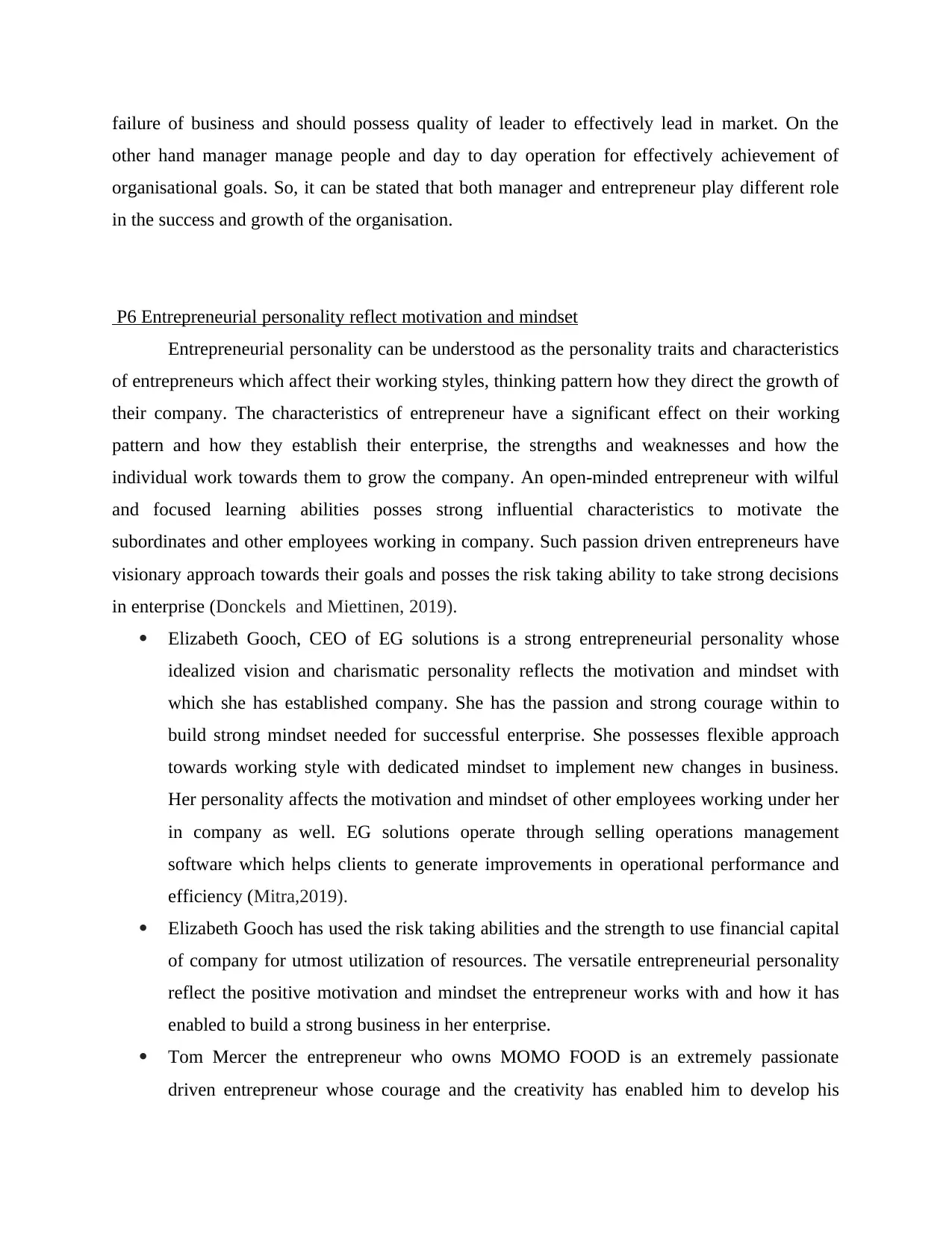
failure of business and should possess quality of leader to effectively lead in market. On the
other hand manager manage people and day to day operation for effectively achievement of
organisational goals. So, it can be stated that both manager and entrepreneur play different role
in the success and growth of the organisation.
P6 Entrepreneurial personality reflect motivation and mindset
Entrepreneurial personality can be understood as the personality traits and characteristics
of entrepreneurs which affect their working styles, thinking pattern how they direct the growth of
their company. The characteristics of entrepreneur have a significant effect on their working
pattern and how they establish their enterprise, the strengths and weaknesses and how the
individual work towards them to grow the company. An open-minded entrepreneur with wilful
and focused learning abilities posses strong influential characteristics to motivate the
subordinates and other employees working in company. Such passion driven entrepreneurs have
visionary approach towards their goals and posses the risk taking ability to take strong decisions
in enterprise (Donckels and Miettinen, 2019).
Elizabeth Gooch, CEO of EG solutions is a strong entrepreneurial personality whose
idealized vision and charismatic personality reflects the motivation and mindset with
which she has established company. She has the passion and strong courage within to
build strong mindset needed for successful enterprise. She possesses flexible approach
towards working style with dedicated mindset to implement new changes in business.
Her personality affects the motivation and mindset of other employees working under her
in company as well. EG solutions operate through selling operations management
software which helps clients to generate improvements in operational performance and
efficiency (Mitra,2019).
Elizabeth Gooch has used the risk taking abilities and the strength to use financial capital
of company for utmost utilization of resources. The versatile entrepreneurial personality
reflect the positive motivation and mindset the entrepreneur works with and how it has
enabled to build a strong business in her enterprise.
Tom Mercer the entrepreneur who owns MOMO FOOD is an extremely passionate
driven entrepreneur whose courage and the creativity has enabled him to develop his
other hand manager manage people and day to day operation for effectively achievement of
organisational goals. So, it can be stated that both manager and entrepreneur play different role
in the success and growth of the organisation.
P6 Entrepreneurial personality reflect motivation and mindset
Entrepreneurial personality can be understood as the personality traits and characteristics
of entrepreneurs which affect their working styles, thinking pattern how they direct the growth of
their company. The characteristics of entrepreneur have a significant effect on their working
pattern and how they establish their enterprise, the strengths and weaknesses and how the
individual work towards them to grow the company. An open-minded entrepreneur with wilful
and focused learning abilities posses strong influential characteristics to motivate the
subordinates and other employees working in company. Such passion driven entrepreneurs have
visionary approach towards their goals and posses the risk taking ability to take strong decisions
in enterprise (Donckels and Miettinen, 2019).
Elizabeth Gooch, CEO of EG solutions is a strong entrepreneurial personality whose
idealized vision and charismatic personality reflects the motivation and mindset with
which she has established company. She has the passion and strong courage within to
build strong mindset needed for successful enterprise. She possesses flexible approach
towards working style with dedicated mindset to implement new changes in business.
Her personality affects the motivation and mindset of other employees working under her
in company as well. EG solutions operate through selling operations management
software which helps clients to generate improvements in operational performance and
efficiency (Mitra,2019).
Elizabeth Gooch has used the risk taking abilities and the strength to use financial capital
of company for utmost utilization of resources. The versatile entrepreneurial personality
reflect the positive motivation and mindset the entrepreneur works with and how it has
enabled to build a strong business in her enterprise.
Tom Mercer the entrepreneur who owns MOMO FOOD is an extremely passionate
driven entrepreneur whose courage and the creativity has enabled him to develop his
Paraphrase This Document
Need a fresh take? Get an instant paraphrase of this document with our AI Paraphraser
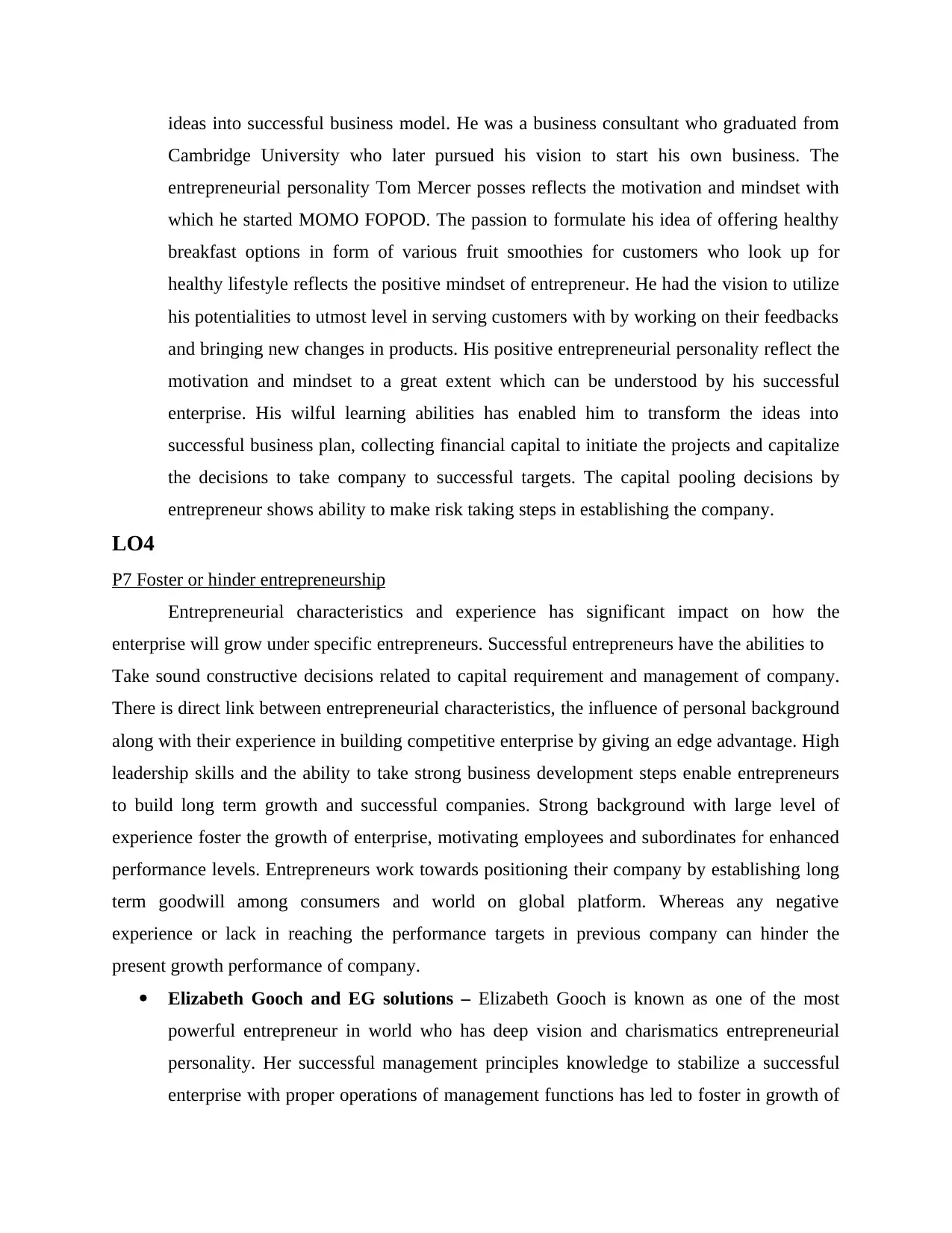
ideas into successful business model. He was a business consultant who graduated from
Cambridge University who later pursued his vision to start his own business. The
entrepreneurial personality Tom Mercer posses reflects the motivation and mindset with
which he started MOMO FOPOD. The passion to formulate his idea of offering healthy
breakfast options in form of various fruit smoothies for customers who look up for
healthy lifestyle reflects the positive mindset of entrepreneur. He had the vision to utilize
his potentialities to utmost level in serving customers with by working on their feedbacks
and bringing new changes in products. His positive entrepreneurial personality reflect the
motivation and mindset to a great extent which can be understood by his successful
enterprise. His wilful learning abilities has enabled him to transform the ideas into
successful business plan, collecting financial capital to initiate the projects and capitalize
the decisions to take company to successful targets. The capital pooling decisions by
entrepreneur shows ability to make risk taking steps in establishing the company.
LO4
P7 Foster or hinder entrepreneurship
Entrepreneurial characteristics and experience has significant impact on how the
enterprise will grow under specific entrepreneurs. Successful entrepreneurs have the abilities to
Take sound constructive decisions related to capital requirement and management of company.
There is direct link between entrepreneurial characteristics, the influence of personal background
along with their experience in building competitive enterprise by giving an edge advantage. High
leadership skills and the ability to take strong business development steps enable entrepreneurs
to build long term growth and successful companies. Strong background with large level of
experience foster the growth of enterprise, motivating employees and subordinates for enhanced
performance levels. Entrepreneurs work towards positioning their company by establishing long
term goodwill among consumers and world on global platform. Whereas any negative
experience or lack in reaching the performance targets in previous company can hinder the
present growth performance of company.
Elizabeth Gooch and EG solutions – Elizabeth Gooch is known as one of the most
powerful entrepreneur in world who has deep vision and charismatics entrepreneurial
personality. Her successful management principles knowledge to stabilize a successful
enterprise with proper operations of management functions has led to foster in growth of
Cambridge University who later pursued his vision to start his own business. The
entrepreneurial personality Tom Mercer posses reflects the motivation and mindset with
which he started MOMO FOPOD. The passion to formulate his idea of offering healthy
breakfast options in form of various fruit smoothies for customers who look up for
healthy lifestyle reflects the positive mindset of entrepreneur. He had the vision to utilize
his potentialities to utmost level in serving customers with by working on their feedbacks
and bringing new changes in products. His positive entrepreneurial personality reflect the
motivation and mindset to a great extent which can be understood by his successful
enterprise. His wilful learning abilities has enabled him to transform the ideas into
successful business plan, collecting financial capital to initiate the projects and capitalize
the decisions to take company to successful targets. The capital pooling decisions by
entrepreneur shows ability to make risk taking steps in establishing the company.
LO4
P7 Foster or hinder entrepreneurship
Entrepreneurial characteristics and experience has significant impact on how the
enterprise will grow under specific entrepreneurs. Successful entrepreneurs have the abilities to
Take sound constructive decisions related to capital requirement and management of company.
There is direct link between entrepreneurial characteristics, the influence of personal background
along with their experience in building competitive enterprise by giving an edge advantage. High
leadership skills and the ability to take strong business development steps enable entrepreneurs
to build long term growth and successful companies. Strong background with large level of
experience foster the growth of enterprise, motivating employees and subordinates for enhanced
performance levels. Entrepreneurs work towards positioning their company by establishing long
term goodwill among consumers and world on global platform. Whereas any negative
experience or lack in reaching the performance targets in previous company can hinder the
present growth performance of company.
Elizabeth Gooch and EG solutions – Elizabeth Gooch is known as one of the most
powerful entrepreneur in world who has deep vision and charismatics entrepreneurial
personality. Her successful management principles knowledge to stabilize a successful
enterprise with proper operations of management functions has led to foster in growth of
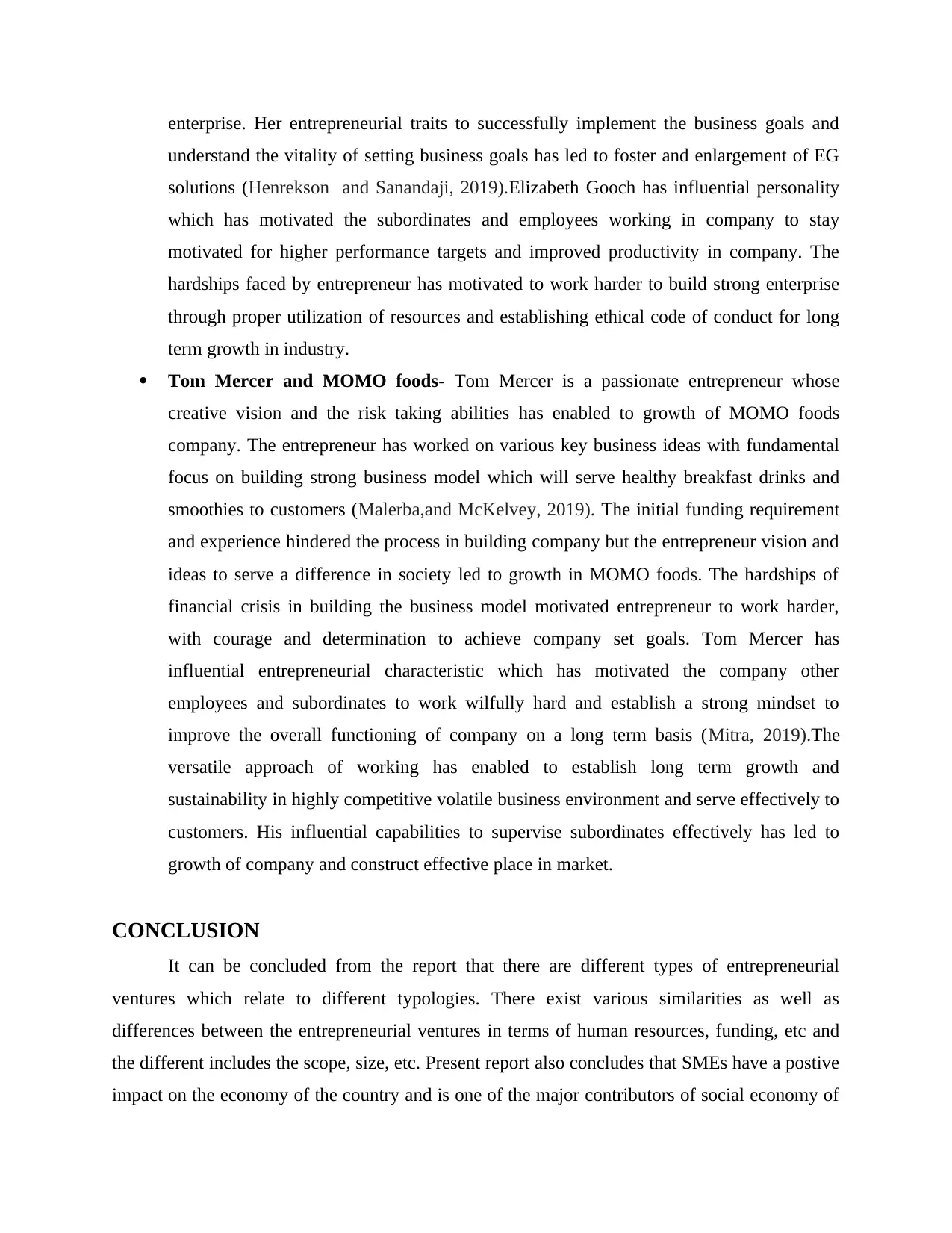
enterprise. Her entrepreneurial traits to successfully implement the business goals and
understand the vitality of setting business goals has led to foster and enlargement of EG
solutions (Henrekson and Sanandaji, 2019).Elizabeth Gooch has influential personality
which has motivated the subordinates and employees working in company to stay
motivated for higher performance targets and improved productivity in company. The
hardships faced by entrepreneur has motivated to work harder to build strong enterprise
through proper utilization of resources and establishing ethical code of conduct for long
term growth in industry.
Tom Mercer and MOMO foods- Tom Mercer is a passionate entrepreneur whose
creative vision and the risk taking abilities has enabled to growth of MOMO foods
company. The entrepreneur has worked on various key business ideas with fundamental
focus on building strong business model which will serve healthy breakfast drinks and
smoothies to customers (Malerba,and McKelvey, 2019). The initial funding requirement
and experience hindered the process in building company but the entrepreneur vision and
ideas to serve a difference in society led to growth in MOMO foods. The hardships of
financial crisis in building the business model motivated entrepreneur to work harder,
with courage and determination to achieve company set goals. Tom Mercer has
influential entrepreneurial characteristic which has motivated the company other
employees and subordinates to work wilfully hard and establish a strong mindset to
improve the overall functioning of company on a long term basis (Mitra, 2019).The
versatile approach of working has enabled to establish long term growth and
sustainability in highly competitive volatile business environment and serve effectively to
customers. His influential capabilities to supervise subordinates effectively has led to
growth of company and construct effective place in market.
CONCLUSION
It can be concluded from the report that there are different types of entrepreneurial
ventures which relate to different typologies. There exist various similarities as well as
differences between the entrepreneurial ventures in terms of human resources, funding, etc and
the different includes the scope, size, etc. Present report also concludes that SMEs have a postive
impact on the economy of the country and is one of the major contributors of social economy of
understand the vitality of setting business goals has led to foster and enlargement of EG
solutions (Henrekson and Sanandaji, 2019).Elizabeth Gooch has influential personality
which has motivated the subordinates and employees working in company to stay
motivated for higher performance targets and improved productivity in company. The
hardships faced by entrepreneur has motivated to work harder to build strong enterprise
through proper utilization of resources and establishing ethical code of conduct for long
term growth in industry.
Tom Mercer and MOMO foods- Tom Mercer is a passionate entrepreneur whose
creative vision and the risk taking abilities has enabled to growth of MOMO foods
company. The entrepreneur has worked on various key business ideas with fundamental
focus on building strong business model which will serve healthy breakfast drinks and
smoothies to customers (Malerba,and McKelvey, 2019). The initial funding requirement
and experience hindered the process in building company but the entrepreneur vision and
ideas to serve a difference in society led to growth in MOMO foods. The hardships of
financial crisis in building the business model motivated entrepreneur to work harder,
with courage and determination to achieve company set goals. Tom Mercer has
influential entrepreneurial characteristic which has motivated the company other
employees and subordinates to work wilfully hard and establish a strong mindset to
improve the overall functioning of company on a long term basis (Mitra, 2019).The
versatile approach of working has enabled to establish long term growth and
sustainability in highly competitive volatile business environment and serve effectively to
customers. His influential capabilities to supervise subordinates effectively has led to
growth of company and construct effective place in market.
CONCLUSION
It can be concluded from the report that there are different types of entrepreneurial
ventures which relate to different typologies. There exist various similarities as well as
differences between the entrepreneurial ventures in terms of human resources, funding, etc and
the different includes the scope, size, etc. Present report also concludes that SMEs have a postive
impact on the economy of the country and is one of the major contributors of social economy of
⊘ This is a preview!⊘
Do you want full access?
Subscribe today to unlock all pages.

Trusted by 1+ million students worldwide
1 out of 16
Related Documents
Your All-in-One AI-Powered Toolkit for Academic Success.
+13062052269
info@desklib.com
Available 24*7 on WhatsApp / Email
![[object Object]](/_next/static/media/star-bottom.7253800d.svg)
Unlock your academic potential
Copyright © 2020–2026 A2Z Services. All Rights Reserved. Developed and managed by ZUCOL.




